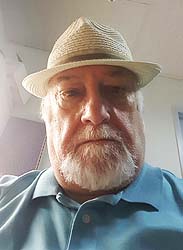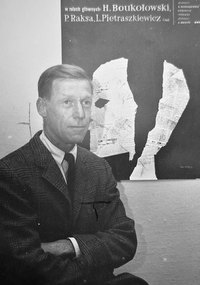 Zygmunt Berling chciał pomóc powstaniu warszawskiemu. Czy generał Stalina zasługuje na chwałę?
Zygmunt Berling chciał pomóc powstaniu warszawskiemu. Czy generał Stalina zasługuje na chwałę?
Marta Grzywacz
 Gen. Zygmunt Berling rozmawia z mieszkańcami warszawskiej Pragi. Po drugiej stronie Wisły dogorywało wówczas powstanie, wrzesień 1944 (Fot. domena publiczna)
Gen. Zygmunt Berling rozmawia z mieszkańcami warszawskiej Pragi. Po drugiej stronie Wisły dogorywało wówczas powstanie, wrzesień 1944 (Fot. domena publiczna)
Obalony niedawno pomnik dowódcy 1. Armii Wojska Polskiego na Saskiej Kępie nazywano pomnikiem obserwatora. Bo generał Berling stał na postumencie z lornetką i patrzył, jak wykrwawia się powstanie warszawskie. Ale to fałszywy obraz, w rzeczywistości próbował mu pomóc, choć nieudolnie.
Dr Jarosław Pałka – historyk wojskowości, sekretarz ds. merytorycznych Archiwum Historii Mówionej Domu Spotkań z Historią. Autor i współautor wielu opracowań i książek m.in. „Generał Stefan Mossor (1896 – 1957). Biografia wojskowa”, „Żołnierze Ludowego Wojska Polskiego. Historie mówione”.
Marta Grzywacz: To prawda, że Zygmunt Berling wypadł z łask Stalina, bo samodzielnie podjął decyzję o desancie na przyczółek czerniakowski w czasie powstania warszawskiego?
Dr Jarosław Pałka: Zanim odpowiem, cofnijmy się do lipca 1944 r., gdy Armia Czerwona prowadziła ofensywę na Warszawę. U jej boku postępowała 1. Armia Wojska Polskiego dowodzona przez Berlinga, który podlegał marszałkowi Rokossowskiemu i Stalinowi. I to oni decydowali o tym, gdzie ta armia miała się znaleźć i o jakie cele walczyć. Nieprzypadkowo najpierw zdobyto Lublin, duże miasto, bo tam miały zasiąść władze PKWN. Ale dla Stalina przejęcie Warszawy z rąk Niemców też było ważne. Wydaje się, że początkowo planował podejść szerokim frontem pod Wisłę, żeby zamknąć Warszawę w kleszczach od południa i północy, i nie walczyć bezpośrednio na ulicach miasta. Ale sytuacja się zmieniła, gdy 1 sierpnia wybuchło powstanie warszawskie.
Stalin był tym zaskoczony?
– Robił wrażenie zaskoczonego. A potem, gdy Churchill go prosił, żeby pomógł Warszawie, odpowiedział, że nie ma powodu, bo tam się nic nie dzieje, że to tylko „awantura warszawska”. Nie pozwolił więc lądować na swoich lotniskach samolotom alianckim, które miały zrzucać pomoc dla Warszawy, i nie zaangażował swojego lotnictwa, żeby walczyło z niemieckim nad miastem. Pierwsze zrzuty żywności i broni radzieckiego lotnictwa nastąpiły więc dopiero 13 września, a to już był schyłek powstania. Stalin nie chciał, żeby odniosło ono sukces, to jasne. To on miał oswobodzić Warszawę, a nie jacyś powstańcy, więc pomoc z jego strony nie wchodziła w grę. Poza tym, na początku sierpnia, jego 2. Dywizja Pancerna wzięła udział w bitwie na przedpolach Warszawy i została tam zatrzymana przez Niemców. Więc miał dodatkowo pretekst – nie mogę wesprzeć powstania, bo opór wroga jest zbyt duży. Pytanie jednak, czy rzucił wystarczająco dużo sił do walki na przedpolach Warszawy, czy też na tyle mało, żeby świadomie opóźnić ofensywę i czekać na to, co się wydarzy z powstaniem. Do 10 września Armia Czerwona walczyła więc o Wołomin i Radzymin, a dopiero potem ruszyła ofensywa na Pragę, więc już bardzo późno.
Dlaczego w ogóle ruszyła?
– Powstanie było politycznie skierowane przeciwko niemu, więc nie miał żadnego interesu, żeby pomagać. Ale z drugiej strony nie mógł nie zrobić niczego, musiał pokazać międzynarodowej opinii publicznej i Polakom, że przynajmniej próbował pomóc, dlatego u boku radzieckich jednostek szła na Warszawę 1. Dywizja Piechoty z armii Berlinga, ta, która walczyła pod Lenino. I to ona przez cztery dni biła się o przejęcie Pragi. Wreszcie 14 września jednostki polskie i radzieckie podeszły na prawy brzeg Wisły. Tymczasem po lewej stronie rzeki dogorywa powstanie. I jest problem, co dalej.
Berling chciał pomóc powstańcom i bez rozkazu Stalina zaczął forsować Wisłę. Przynajmniej tak pisze we wspomnieniach. Z drugiej strony jednak zachował się rozkaz gen. Michaiła Malinina z 1. Frontu Białoruskiego, który wyznacza berlingowcom zadanie sforsowania rzeki.
– No właśnie.
Niemożliwe, żeby Berling podjął taką decyzję samodzielnie. Nic nie mogło się odbyć bez zgody Stalina, który miał wszystko zaplanowane. Po to przecież 1. Armia została wprowadzona do miasta, na Pragę, żeby przedrzeć się na drugi brzeg rzeki, a nie stać i patrzeć.
Stalin chciał pokazać, że on też włącza się do walki o polską stolicę, z pełną świadomością, że siły, które rzuca do jej zdobycia, są niewystarczające.
 Berling i Wanda Wasilewska w Sielcach, miejscu formowania dywizji kościuszkowskiej Fot. NAC
Berling i Wanda Wasilewska w Sielcach, miejscu formowania dywizji kościuszkowskiej Fot. NAC
Wysłał na początek 400 żołnierzy.
– Potem kolejne setki, w sumie kilka tysięcy, ale to i tak zdecydowanie za mało, żeby zdobyć miasto. Tym bardziej że polska armia była mniej liczna i stosunkowo słabo wyposażona w porównaniu z siedmioma armiami radzieckimi, które miały więcej choćby sprzętu przeciwpancernego i przeciwlotniczego.
Dlaczego, skoro armia Berlinga była częścią Armii Radzieckiej?
– Ale „ludowe” wojsko dopiero się tworzyło, nie zdążono go wyekwipować. Powiedzmy szczerze, że polska armia miała siłę zwiększonego korpusu radzieckiego. Ale bardziej prestiżowe jest mówienie, że posiada się armię niż korpus. I ta słaba armia zaczęła podchodzić w okolice zoo i mostu Poniatowskiego 14 września. Przegrupowała się, ale przez to straciła jeden dzień i dopiero w nocy z 15 na 16 września spróbowała przedostać się na lewy brzeg Wisły.
Straciła jeden dzień zaskoczenia, więc Niemcy byli już przygotowani.
– Oczywiście. A można było przecież zaplanować próbę zdobycia przyczółków na Wiśle z marszu, ale tylko pod warunkiem, że Berling miałby wsparcie kilku radzieckich jednostek. Początkowo Berlingowi się wydawało, że najbliżej jest do powstańców na Żoliborzu, więc tam ma być główny punkt ciężkości jego działań. Jednak w międzyczasie idą zwiadowcy z jednej i drugiej strony i okazuje się, że na Czerniakowie są powstańcy, którzy mają dostęp do Wisły w okolicach Solca i Wilanowskiej, poniżej mostu Poniatowskiego, więc Berling decyduje się uderzyć w tym miejscu.
Ma prawo decydować o operacji samodzielnie?
– W ramach działań armii tak. Uderzył więc na przyczółek czerniakowski raz – tutaj walczyła 3. Dywizja Piechoty, potem forsował rzekę ponownie. A jednocześnie 2. Dywizja uderzyła na Żoliborzu, i dodatkowo pomocnicze desanty próbowały przedrzeć się w okolice mostu Poniatowskiego i Siekierek. Ale armia polska była zbyt słaba, żeby zdobyć Warszawę. Musiałaby zostać poważnie wzmocniona przez siły radzieckie – środki przeprawowe, lotnictwo, ciężką artylerię, piechotę. Tylko że Rokossowski tego Berlingowi nie zapewnił. Wydaje się też, że samo forsowanie Wisły zostało źle przygotowane. W relacjach wygląda to tak, jakby panował chaos – Berling rozpraszał siły, atakował w różnych miejscach. Inna sprawa, że zdobycie miasta przez forsowanie rzeki, gdy walczy się z przeciwnikiem ukrytym w terenie zabudowanym, jest piekielnie trudne. Wróg może strzelać z wysokich okien, może się ukrywać w budynkach i ma rzekę jak na dłoni.
Dlatego Berling zdecydował się użyć zasłony dymnej?
– Tak, ale wprowadziła ona jeszcze większy chaos, bo berlingowcom również przesłoniła widok, a jednocześnie wskazała Niemcom miejsca, gdzie będą lądować. Kiedy już doszło do nalotów radzieckich, to nie w tym momencie, gdy trwał najmocniejszy ostrzał artylerii niemieckiej. No i kolejny błąd – na drugą stronę rzeki nie zostali przerzuceni wyżsi dowódcy pododdziałów i oficerowie ze sztabu. Więc gdy już polskie pułki znalazły się na zachodnim brzegu, to w większości bez oficerów, którzy mogliby koordynować działania. A przecież ci żołnierze nie mieli żadnego doświadczenia w walkach w mieście i straty wśród nich były ogromne – około 3700 zabitych, rannych i zaginionych. Przyczółki zlikwidowano i po tygodniu, 23 września, walka zakończyła się przegraną berlingowców.
 Zniszczony pomnik generała Berlinga ADAM STĘPIEŃ
Zniszczony pomnik generała Berlinga ADAM STĘPIEŃ
Stalin świadomie poświęcił berlingowców?
– Wydaje mi się, że dobrze wiedział, że nie są w stanie samodzielnie zdobyć miasta. I w tym sensie ich poświęcił, chociaż oczywiście żołnierze Berlinga bardzo chcieli walczyć za swoją stolicę.
Jak dużą nadzieję pokładali powstańcy w ofensywie sowieckiej?
– 9 września Komenda Główna AK podjęła rozmowy kapitulacyjne z Niemcami, jednak przerwała je dwa dni później na wieść o rozpoczęciu ofensywy sowieckiej. Wielkie nadzieje pokładali w niej też sami mieszkańcy. Odgłosy zbliżającego się frontu, a wreszcie wieści o zdobyciu Pragi dawały nadzieję. Wszystko to było złudne i w sumie przedłużyło agonię miasta.
Nieudany atak na przyczółek czerniakowski był powodem, dla którego Berling został odsunięty od dowodzenia 1. Armią Wojska Polskiego?
– On sam pisał, że odsunięto go, bo próbował wymusić walkę o Warszawę, ale prawda jest taka, że nie był dobrym dowódcą, popełniał błędy pod Lenino, pod Puławami i Dęblinem, doszła jeszcze ta przegrana bitwa o przyczółki warszawskie. Gdyby jego działania były samowolne, to zostałby zdjęty od razu, a nastąpiło to dopiero 30 września, czyli dwa tygodnie po forsowaniu Wisły. Ta nieudolna operacja była jednak tylko pretekstem, bo od dłuższego czasu Berling był skonfliktowany z polskimi komunistami i Michałem Rolą-Żymierskim, który stał na czele Ludowego Wojska Polskiego, więc chętnie się go pozbyto. Berling miał trudny charakter i swoje własne pomysły na rozwiązanie sprawy polskiej po wojnie, a to się Stalinowi nie podobało.
Berling myślał, żeby rządy w Polsce oprzeć na dyktaturze wojskowej, trochę pobrzmiewały w tym tradycje piłsudczykowskie, ale komuniści dążyli do tego, żeby o wszystkim decydowała partia.
I tego też chciał Stalin.
Te tradycje piłsudczykowskie nie były przypadkowe, Berling służył w Legionach, wziął udział w wojnie polsko-bolszewickiej, poparł Piłsudskiego po przewrocie majowym. A gdy wybuchła wojna stanął po stronie sowietów. Dziwny zwrot akcji.
– Jego kariera początkowo bardzo ładnie się rozwijała. On nie tylko wziął udział w wojnie polsko-bolszewickiej, ale także dowodził batalionem w walkach o Lwów i dostał za to order Virtuti Militari, to duże wyróżnienie, był bohaterem.
Miał wtedy dwadzieścia parę lat.
– I był bardzo dobrze rokującym dowódcą. A jeszcze przed trzydziestką skończył Wyższą Szkołę Wojenną, prestiżową, szkolącą kadry wojskowe. W latach 30. dostał dowództwo 6. i 4. Pułku Piechoty Legionów. I to też były prestiżowe formacje. Jego kariera załamała się nagle w 1939 r.
Naprawdę z powodów obyczajowych?
– Ten rozwód z rumuńską arystokratką Jolandą Magyarosi zdecydowanie mu nie posłużył. Poszło o majątek, ona zarzucała mu, że był nieuczciwy, że za dużo sobie przywłaszczył, że źle się z nią obszedł. Sprawa oparła się o oficerski sąd honorowy, który orzekł, że jego zachowanie było niegodne oficera.
Magyarosi była jego drugą żoną. Z pierwszą miał czworo dzieci, w tym córkę Barbarę, która była sanitariuszką w powstaniu warszawskim. Ciekawe, czy o tym wiedział.
– W sierpniu i we wrześniu 1944 r. nie mógł tego wiedzieć. Ale wracając do 1939 r. – Berling miał trudny charakter, wchodził w konflikty z przełożonymi, no i zarzucano mu, że zaniedbał swoją jednostkę. Pisano, że jego 4. Pułk jest najgorszym w dywizji. Gen. Michał Karaszewicz-Tokarzewski [był przewodniczącym Oficerskiego Trybunału Orzekającego] wysłał nawet raport w tej sprawie do marszałka Edwarda Rydza-Śmigłego z postulatem, żeby odsunąć Berlinga od dowodzenia pułkiem. I tak się stało. Z tą tylko różnicą, że Berling sam poprosił o zwolnienie go z wojska. Odszedł 31 lipca 1939 r.
 Pomnik Zygmunta Berlinga przy Trasie Łazienkowskiej
Pomnik Zygmunta Berlinga przy Trasie Łazienkowskiej
A zaraz potem wybuchła wojna, więc chciał wrócić.
– Tyle że nikt już nie chciał go z powrotem. Berling mieszkał w tym czasie w Wilnie i tak jak tysiące polskich oficerów, którzy znaleźli się po wschodniej stronie, trafił do obozu w Starobielsku.
Tam nawiązał współpracę z NKWD.
Dlaczego? Nie mógł przecież przeczuwać, co się wydarzy…
– Nikt nie mógł sobie wyobrazić, że może się zdarzyć Katyń i do czego Sowieci są zdolni. Stalin w połowie 1940 r. zaczął się zastanawiać nad stworzeniem polskiej formacji, która mogłaby walczyć po stronie Armii Czerwonej, bo rozważał wojnę z Niemcami. Szukał najpierw polskich generałów, którzy chcieliby stanąć pod jego dowództwem, ale nie znalazł. Trafiło mu się natomiast kilkunastu oficerów niższego szczebla, w tym Berling, wówczas podpułkownik, którzy zgodzili się współpracować. Berling zrobił to z powodów ambicjonalnych, może wydawało mu się, że będzie mógł odgrywać przy boku Stalina jakąś większą rolę.
Jakie były jego zadania?
– Kiedy wytypowano tych oficerów, nie było jeszcze planów, jakie mają mieć zadania i co z nimi robić. Przejściowo umieszczono ich w willi w Małachowce, pod Moskwą, gdzie byli sondowani, a potem mieli stanąć na czele polskojęzycznej dywizji Armii Czerwonej. Ale Hitler napadł na Związek Radziecki i nagle się okazało, że to nie on jest sojusznikiem, tylko Wielka Brytania, więc i z Polakami, którzy tworzyli rząd na uchodźstwie, trzeba się jakoś dogadać. Na mocy układu Sikorski-Majski Stalin pozwolił na stworzenie polskiego wojska pod dowództwem gen. Władysława Andersa, i podległego prawowitej władzy polskiej w Londynie. Swoje plany wobec polskich oficerów musiał więc schować do szuflady. Ci z Małachowki też byli kierowani do Andersa. Berling poszedł tam jako sowiecki agent czy też agent wpływu, był nawet szefem sztabu dywizji i dowódcą bazy ewakuacyjnej w Krasnowodsku, ale kiedy doszło do ewakuacji armii Andersa, złamał jego rozkaz i został w Związku Radzieckim.
Stalin mu kazał?
– Pewnie tak, skoro już wcześniej się zastanawiał, czy nie wykorzystać Berlinga jako tego, który stanie przy jego boku na czele polskojęzycznej jednostki. Berling pewnie sobie wykalkulował, że u Andersa będzie jednym z wielu oficerów średniego szczebla. Że pewnie wyjdą na jaw jego rozmowy z NKWD, może będzie marginalizowany, albo nawet dostanie jakąś karę, więc nie wyszedł z polskim wojskiem. Anders uznał to za dezercję i zdradę. W lipcu 1943 r. sąd wojskowy zaocznie skazał Berlinga na karę śmierci.
 Uroczystości pod pomnikiem gen. Berlinga Fot. Bartosz Bobkowski / Agencja Gazeta
Uroczystości pod pomnikiem gen. Berlinga Fot. Bartosz Bobkowski / Agencja Gazeta
A kiedy Anders zniknął z horyzontu, Stalin wrócił do pomysłu stworzenia własnego wojska polskiego.
– Pokazywał w ten sposób, że będzie głównym rozgrywającym w sprawie polskiej. Miał już reprezentację polityczną z polskich komunistów, więc potrzebował wojska jako przeciwwagi dla armii Andersa i oddziałów podległych Sikorskiemu.
Zgodził się nawet na biało-czerwoną flagę, na orła – co prawda bez korony, ale jednak, żołnierze mogli śpiewać „Rotę”, był ksiądz i przysięga 15 lipca 1943 r., czyli w rocznicę bitwy pod Grunwaldem.
Wszystkie atrybuty były zachowane z tą różnicą, że było to wojsko podległe Stalinowi. Na jego czele stanął Berling, a potem Michał Rola-Żymierski.
Czy to prawda, że Berling wydawał wyroki śmierci na działaczy niepodległościowych?
– To prawda. Zachowało się kilka takich wyroków z jego podpisem. Na przykład wyrok sądu wojskowego garnizonu w Lublinie z 8 listopada 1944 r. na Zygmunta Paszkowskiego, który za przechowywanie broni bez zezwolenia władzy został skazany na śmierć przez rozstrzelanie. Następny wyrok z 10 listopada 1944 r. na Czesława Brzezickiego. Podczas rewizji w jego mieszkaniu znaleziono ulotkę WiN, która nawoływała do obalenia władzy państwowej, nie zgłosił się też do rejestracji poborowych i za późno zdał broń, za co został skazany na karę śmierci. Ale Berling zmienił ten akurat wyrok na 10 lat więzienia. Kolejny wyrok śmierci, też z 10 listopada, na Władysława i Stefana Osińskich, członków Batalionów Chłopskich, za to, że dążyli do usunięcia ustroju demokratycznego. Takich wyroków Berling podpisał co najmniej kilka.
Nawet jednak ta daleko posunięta usłużność wobec sowietów nie uchroniła go przed niechęcią ze strony Stalina, bo i tak po wojnie przestał odgrywać jakąkolwiek rolę.
– Nawet więcej. Został karnie wysłany do Moskwy. Nie chciał tam jechać. Pisał do Stalina, błagając, żeby go ratował przed „trockistowską bandą”, gdzie rządzą Wanda Wasilewska, Edward Osóbka-Morawski, Rola-Żymierski, za którymi – jak twierdził – kryją się w istocie Hilary Minc, Jakub Berman i Stanisław Radkiewicz, czyli Żydzi, ale ten list raczej nie trafił do adresata. W Moskwie Berling podejmował jeszcze jakieś głodówki, protestował, ale to nie pomogło. Wolno mu było wrócić dopiero po wyborach, w 1947 r., kiedy na scenie byli już inni bohaterowie. Żeby go czymś zająć, dostał pozwolenie na zorganizowanie Akademii Sztabu Generalnego, której był komendantem. A kiedy został stamtąd zwolniony, otrzymywał już tylko synekury – wiceministra rolnictwa, działacza ZBOWiD-u, a gen. Jaruzelski wykorzystywał go jako symbol połączenia elementu narodowego z komunistycznym, że niby on, wywodzący się z Legionów, zrozumiał jednak ducha czasu, i to, że Polsce będzie lepiej w sojuszu ze Związkiem Radzieckim.
Po śmierci jego imieniem zostaje nazwany most Łazienkowski, obok którego stanął pomnik, niedawno zniszczony przez nieznanych sprawców.
– Nazywano go pomnikiem obserwatora, bo Berling stał na nim z lornetką w ręce. Stał i patrzył, jak wykrwawia się powstanie warszawskie, co nie jest prawdą, bo jednak walczył, choć nieudolnie. W ramach dekomunizacji pomnik miał być przeniesiony do magazynu Muzeum Powstania Warszawskiego. Myślę, że to by wystarczyło. Nie trzeba go było niszczyć. To za daleko poszło.







